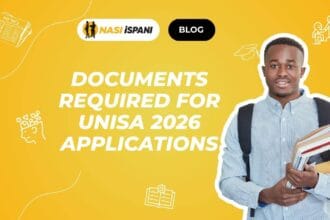Applying for UNISA 2026 Applications requires more than just completing an online form; having the correct documents ready is essential. UNISA, South Africa’s leading distance learning university, requires verified documents to process every application smoothly.
Incomplete or missing documents are a common reason why applications are delayed or rejected. For UNISA 2026 Applications, students must provide official documents such as school qualifications, tertiary records (if applicable), identity documents, marriage or divorce certificates, and sworn translations for documents not in English or Afrikaans.
This guide focuses solely on the official documents required for UNISA 2026 Applications, helping you ensure your application is complete, accurate, and ready for submission.
A Quick Reminder About UNISA 2026 Applications
Applications for the 2026 academic year must be submitted during the official application window:
- Undergraduate qualifications: 18 August – 10 October 2025
- Honours degrees & postgraduate diplomas: 18 August – 10 October 2025
- Master’s & doctoral qualifications: 2 September – 21 November 2025 (some exceptions apply)
Make sure your documents are ready before the deadline, as incomplete or late submissions will not be processed.
Learn more: UNISA 2026 Applications Now Open
Documents Needed for UNISA 2026 Applications
When applying for UNISA 2026 Applications, you’ll need to scan and upload all required documents to an electronic device before submitting your application. These documents form a critical part of the admissions process, and without them your application will not be processed.
Here’s the complete list of official documents required by UNISA:
1. School Qualifications
- A certified copy of your Senior Certificate, National Senior Certificate (NSC), or equivalent qualification.
- If you are still in matric, you may upload your latest available results.
2. Tertiary Academic Records (if applicable)
- A certified copy of your official tertiary academic transcript if you have previously studied at another university or college.
- Important: Internet copies or unofficial results will not be accepted.
- If you previously studied at UNISA, you may still be required to upload your record for verification.
3. Identity Document
- South African applicants: Copy of your green barcoded ID book or smart ID card.
- International applicants: Copy of your valid passport.
4. Marriage or Divorce Documentation (if applicable)
- Copy of your marriage certificate (if your surname differs from your ID or school records).
- Copy of your divorce decree if your surname has changed after a divorce.
5. Sworn Translations
- If your qualifications or supporting documents are not in English or Afrikaans, you must provide a sworn translation.
- Both the original document and the translation must be uploaded.
6. Additional Documents (if required by your qualification)
- Some qualifications may require extra supporting documents, such as:
- A curriculum vitae (CV) or portfolio for specialised programmes.
- Proof of professional registration for certain postgraduate courses.
- UNISA will specify these requirements during the application process.
Additional Notes from UNISA
When preparing documents for UNISA 2026 Applications, keep the following official notes in mind:
- Re-upload of documents for older applications
If you applied before 2016, you are required to upload all the necessary documents again. Failure to do so may result in your application not being processed. - Additional documents may be required
While the standard list of documents applies to most qualifications, some courses especially postgraduate programmes may require extra documentation such as a CV, professional certificates, or a portfolio. Always check the specific requirements for your chosen qualification. - Original documents may be requested
UNISA reserves the right to ask for original documents at any stage of the admissions process. It’s important to keep your originals safe and ready for submission if requested. - Fraudulent documents are a serious offence
Submitting forged, altered, or fraudulent documents is a violation of UNISA’s Student Disciplinary Code. This may result in your application being cancelled and could lead to permanent exclusion from the university.
How to Prepare Your Documents
To make sure your application for UNISA 2026 Applications is processed smoothly, your documents must be scanned, uploaded, and presented correctly. Here are key tips to follow:
- Scan in the correct format
Save your documents as PDFs or clear image files (JPEG/PNG). PDF is preferred because it keeps the entire document intact. - Check clarity and readability
Ensure that all text, stamps, and signatures are clearly visible. Blurry or incomplete scans may cause your application to be rejected. - Maintain proper orientation
Scan documents in the upright position so they are easy to read without rotation. - Avoid cropping or cutting edges
Every corner of the page, including stamps or certification details, must be included. - Keep file sizes manageable
UNISA’s online system may reject files that are too large. Use free PDF compressors if necessary, but make sure quality is not compromised. - Label your files clearly
Use simple names such as “ID.pdf”, “Matric Certificate.pdf”, or “Academic Transcript.pdf” for easier uploading and review. - Keep originals safe
UNISA may request the original versions of your documents at any time for verification. Store them securely in case they are needed.
Common Mistakes to Avoid
When submitting documents for UNISA 2026 Applications, even small errors can cause delays or lead to your application being rejected. Here are some common mistakes applicants should avoid:
- Uploading unofficial records
Internet printouts or screenshots of tertiary results are not accepted. Only official, certified academic transcripts should be submitted. - Skipping translations
If your documents are not in English or Afrikaans, you must provide a sworn translation along with the original. Forgetting this will make your application incomplete. - Leaving out marital documents
If your surname is different from what appears on your ID or qualifications, you must include a marriage certificate or divorce decree. Missing this step often leads to verification issues. - Submitting poor-quality scans
Blurry, cropped, or incomplete scans can’t be processed. Always ensure your documents are clear, legible, and properly certified before uploading. - Not checking file formats and sizes
Uploading files in the wrong format, or exceeding UNISA’s size limits, can result in failed uploads that go unnoticed until it’s too late.
By double-checking your documents before uploading, you can avoid these errors and ensure that your application is processed without unnecessary delays.
Applying for UNISA 2026 Applications is a big step towards achieving your academic goals, and having the correct documents ready can make all the difference. From your school qualifications and ID to sworn translations and additional supporting documents, every file plays a vital role in ensuring your application is processed smoothly.
By carefully scanning, uploading, and double-checking your documents, you can avoid unnecessary delays and strengthen your chances of acceptance. Always keep your original documents safe, as UNISA may request them for verification.
If you’re unsure about any requirement, consult the official UNISA website or contact the admissions office for clarity. A complete and accurate set of documents is the foundation of a successful application




